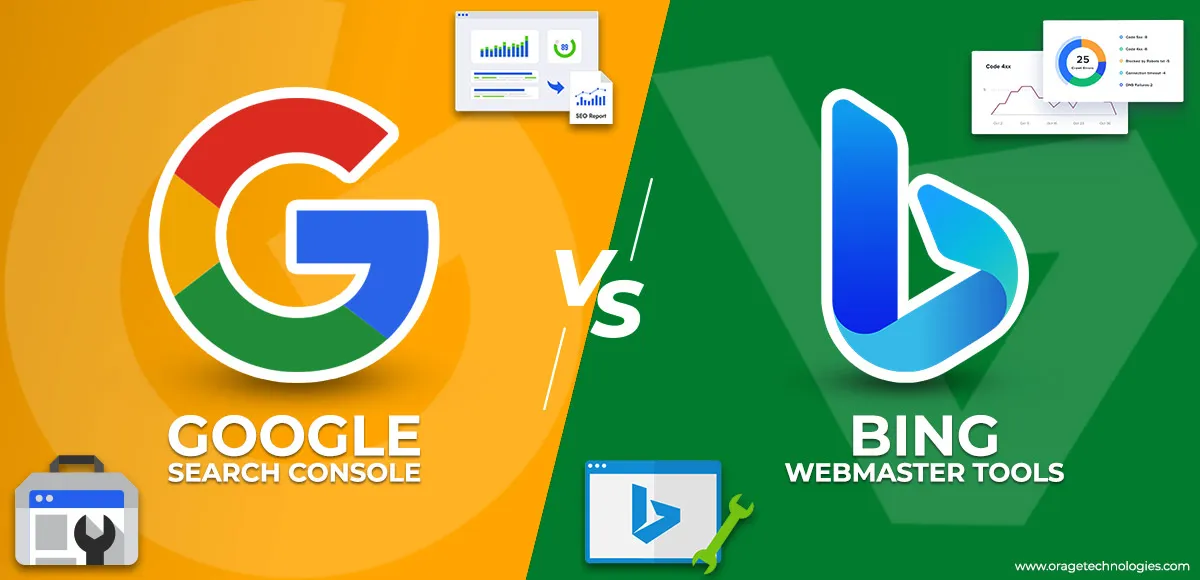
Divya Stuti, with over 5 years of experience in Digital Marketing & Content Writing, has a knack for turning complex Marketing strategies, trends, and jargon...
One of the most important things in search engine optimization (SEO) is the search console. Every search engine has its own search console. For Google, the search engine is the Google search console, while for Bing, it is the Bing webmaster tool. These tools can help website owners optimize, manage, and monitor their digital presence.
They offer in-depth insights and analysis into some of the major metrics important for SEO. Some of the key metrics are organic search traffic, click-through rates (CTR), and average positions. Moreover, they also help in resolving various issues such as crawlability errors, submitting XML sitemaps, and monitoring URL parameters.
Comparing Google Search Console vs Bing Webmaster Tools
Given below is a table of Google Search Console vs Bing Webmaster Tools. This table will clearly differentiate between the two:
| Feature | Google Search Console | Bing Webmaster Tools |
| Search Engine | Bing | |
| Key Metrics | Search queries, impressions, clicks, average position | Search queries, impressions, clicks, backlinks |
| Crawl and Indexing Reports | Detailed crawl errors, index coverage, mobile usability | Crawl control, indexing status, backlink data |
| XML Sitemap Submission | Yes | Yes |
| Robots.txt Management | Test and validate robots.txt | Similar functionality available |
| URL Parameters Management | Yes | Yes |
| Mobile Usability Insights | Detailed insights and performance reports | Basic mobile performance tracking |
| Backlink Data | Limited focus | Strong focus on backlinks and crawl issues |
| User Interface (UI/UX) | Clean and visually appealing, charts & graphs | Simple and straightforward, but less visual |
| Crawl Rate Control | No direct control | Yes, allows adjustment during peak times |
| Integration with Other Tools | Integrates with Google Analytics and Google Ads | Limited integrations |
| Social Media Integration | No | Yes, some social media integration |
| Platform Compatibility | Works well across multiple platforms (desktop/mobile) | Compatible with various platforms (desktop/mobile) |
| Unique Features | Structured data analysis, mobile usability reports | Backlink focus, crawl rate control, better social media |
Features and Functionality
Both of these Search Engine Optimization tools offer some common features and functionalities. At the same time, there are minor differences between the two. Let’s look at all of the features and usability in detail:
Data and Analytics
When comparing Google Search Console vs Bing Webmaster Tools, we see that both these tools allow users to track and analyze website performance. From search queries to impression and click metrics, these tools can help you track website performance in depth.
It will give data about specific URLs, mobile usability, and structured data from the Google Search Console. On the other hand, Bing Webmaster Tools centers on crawl issues, indexing status, and backlinks information. Both of these tools provide insights into your website’s performance on the two search engines – Google and Bing.
Crawl and Indexing
Crawl and Indexing are other factors in understanding of how search engines work on different sites. Google Search Console and Bing Webmaster Tools have features that solve crawl errors, blocked resources and index coverage. Google offers comprehensive crawl statistics on aspects like bad links, whereas Bing empowers users to manage crawl rates for optimum site effectiveness during the biggest traffic inrush.
Managing key Search Engine Optimization elements With these tools is easy and you can even submit XML sitemaps to inform search engines about your site’s structure. You can also experiment and optimise your robots.txt file in order to decide which sections of your site can be crawled and indexed by the search engines. It avoids content duplication, which leads to better indexes through the proper handling of the URL parameters.
Search Performance and Optimization
They are useful in tracking the performance on the search engine. Google Search Console and Bing Webmaster Tools can help monitor search queries, impressions, and clicks to further enhance Search Engine Optimization techniques. They also provide data on mobile performance and crawl errors which help you to adjust yours for better visibility. Comparing Performance Data Both tools provide helpful statistics that are used in the process of website optimization.
For instance, Google Search Console shares average position data, click-through rate, and other mobile figures. Another tool, which provides similar information is Bing Webmaster Tools, but it also offers tips on how to enhance the site’s SEO and control the crawling.
User Interface and Experience
Google Search Console provides smooth, and easy to use interface meaning that one does not struggle to find his/her way around it. Regarding the interface, Bing Webmaster Tools also has a straightforward layout with an emphasis on core functions and analytics. They also both rely on graphical representations like charts and graphs to assist the user in the assessment of trends in performance.
Integrations and Compatibility
Google Search Console works well with Google Analytics and Google Ads since you can get many traffic and advertising insights. Also, Bing Webmaster Tools is friendly when it comes to its compatibility with other platforms, desktop and mobile. This flexibility enables the owner to manage his/her website at any time and from any place in the world.
Final Thoughts
Google Search Console and Bing Webmaster Tools are important tools used in the optimization of websites. Again, while Google Search Console provides more detail, Bing Webmaster Tools have features such as crawl, which allow for controlling the flow and social media connections that are not available in Google Search Console. The good thing about these two is that you get data from different search engines, and therefore help you in optimizing your SEO.

Divya Stuti, with over 5 years of experience in Digital Marketing & Content Writing, has a knack for turning complex Marketing strategies, trends, and jargon into interesting and easy to digest blog posts. Whether she’s breaking down the SEO, Social Media or decoding campaigns, Divya knows how to make marketing feel exciting and easy to understand. Armed with a sharp eye for strategy and a storyteller’s instinct, she writes with clarity, creativity, and just the right dose of wit.
More Posts

